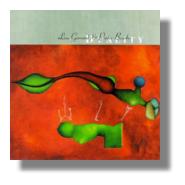| Articles de presse Lisa Gerrard » 1998 |
 |
Lisa Gerrard & Pieter Bourke » Duality Review The Phantom Tollbooth Duality review |
Artist: Lisa Gerrard and Pieter Bourke
Label: 4AD Records
Time: 10 tracks/45:51
Dead Can Dance's mix of the ethereal and the ethnic was a big hit with me when I was introduced to it just after Christmas last year. Lisa Gerrard is the lead vocalist (singer seems like too limiting a word) with Dead Can Dance, and along with percussionist Pieter Bourke (from Soma), she has crafted this album in a style that shows that connection.
Most shops would place this in either a 'New Age' or 'World Music' section, but neither of those is a very good pigeonhole. The music contains strong influences from Middle-Eastern and African cultures--my Iranian mum has commented on the similarities between some songs and Iranian music--as well as lots of classical and ethereal sounds. Twelfth century Benedictine nun, Hildegard Von Bingen is cited as an influence for parts of the recording. The balance of these elements varies from song to song. For example, "Forest Veil" has a very strong ethnic sound, with an African tribal feel to the vocal harmonies and percussive backing, but the instrumental melodies add a new dimension to this. The music cannot be said to copy directly any of these influences, but instead meshes them together to produce a beautiful, sometimes chilling soundscape, with the ethereal influences higher in the balance than the others, in contrast with Dead Can Dance. This album is closer to Dead Can Dance, though, than the more orchestrated sounds of The Mirror Pool, Gerrard's first solo release, The vocals are always at the front of the mix. Gerrard is often joined by a group of singers, and classical and baroque influences come out in the harmonies and choral work here. Despite the presence of vocals, this album could, for the most part, be regarded as instrumental due to the absence of English lyrics. There are some, but very few. To me, the beautiful nature of the music and the occasional meditational passages feel worshipful, but, while I have heard suggestions that Lisa may be a Christian, there are no real clues as to the spiritual place the artists are coming from.
Pieter Bourke is noted for his skill as a percussionist, and the range of rhythms and instruments here certainly helps build the sounds up. As with the rest of the music, the percussion draws influences from a wide range of cultures, particularly African cultures, and careful listening can help the listener appreciate the album further for this element.
Included in the package is a second CD, which features the album track "The Human Game," along with two further tracks, "Awakening" and "Jungabya" (used in the film "Nadro.") Unfamiliar with the film, I can't comment on that connection, but these tracks would make up a good single if there were any radio stations likely to give this wide play. The second of the tracks is undoubtedly weaker than the songs on the main album, and its length means that this CD won't be getting much time in my player, but this is a nice addition.
This music will not be to everybody's tastes--it lacks the familiarity of most western music--but is an excellent example of what eclectic influences and God-given creativity can produce. I'm not sure that this surpasses The Mirror Pool but it is certainly worthy of a place beside it.
By James Stewart
The Phantom Tollbooth